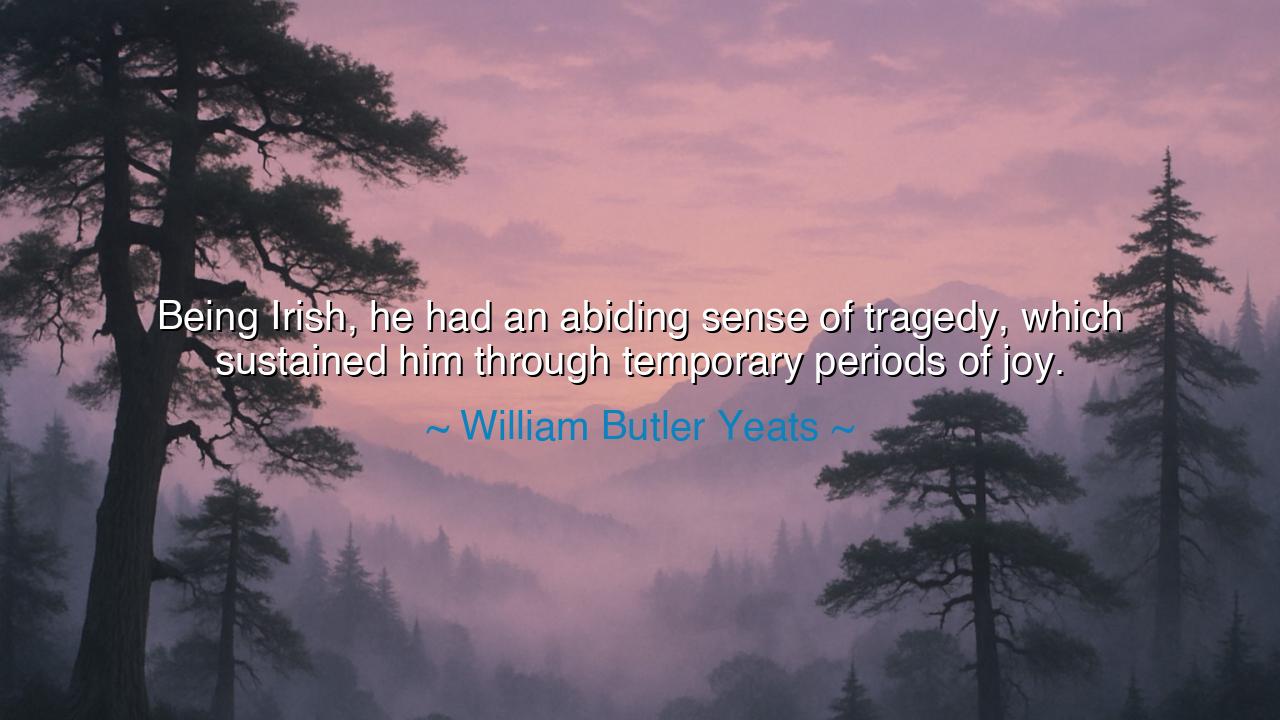
Being Irish, he had an abiding sense of tragedy, which sustained
Being Irish, he had an abiding sense of tragedy, which sustained him through temporary periods of joy.






Hearken, O seekers of sorrow and joy, to the haunting wisdom of William Butler Yeats, who wrote: “Being Irish, he had an abiding sense of tragedy, which sustained him through temporary periods of joy.” In these few words, Yeats captures the paradox of the Irish soul — a heart that knows that beauty and sorrow walk hand in hand, that laughter is never far from tears, and that joy itself is made richer by the shadow of pain. His words are not cynical, but deeply human, born from a land and people who have long carried both grief and grace within the same breath.
To understand this saying, one must understand Ireland — a country carved by history into both wound and wonder. For centuries, the Irish lived beneath hardship: famine, exile, colonization, and struggle. Yet out of this suffering came poetry, music, and laughter that could melt stone. The “abiding sense of tragedy” Yeats speaks of is not despair, but awareness — a kind of wisdom born of endurance. It is the recognition that life is fleeting, that happiness is fragile, and that even joy must one day bow before time. But rather than destroy the spirit, this understanding sustains it, for the one who has made peace with sorrow can never be fully broken by it.
Yeats himself was no stranger to this truth. Living in an Ireland divided between beauty and turmoil, he felt in his bones the contradictions of his homeland — its mysticism and violence, its dreams and defeats. In his poetry, the hills of Sligo shimmer with light, yet the air trembles with melancholy. His “abiding sense of tragedy” became the wellspring of his art: the knowledge that joy without sorrow is shallow, and sorrow without art is unbearable. By embracing both, he found meaning — not in escape from life’s duality, but in surrender to it.
There is, too, in Yeats’s words, a universal reflection on the human condition. Every soul, whether Irish or not, must learn that joy cannot be constant. To live wisely is not to chase happiness like a mirage, but to understand that suffering and delight are woven threads of the same tapestry. The “temporary periods of joy” Yeats describes are precious precisely because they are brief. The man or woman who grasps this truth learns to drink deeply of happiness when it comes, knowing it is lent, not owned — and to bear sorrow when it returns, knowing it too shall pass.
Consider the story of Oscar Wilde, another son of Ireland, whose life was a tragic masterpiece of beauty and pain. He rose to brilliance, adored and celebrated, but was cast down by scandal and imprisonment. Yet even in his fall, he found words of gold. “Where there is sorrow,” he wrote, “there is holy ground.” Like Yeats, Wilde understood that tragedy is not the enemy of joy but its foundation. It teaches compassion, humility, and the ability to find light in darkness — lessons no easy life could offer.
Yeats’s insight also holds a kind of strength — the strength of the tragic hero, who stands in full knowledge of fate and still walks forward. To possess “an abiding sense of tragedy” is to live awake — to see clearly the world’s pain, yet not to be crushed by it. Such souls do not deny joy, but they do not depend on it. Their peace lies in acceptance, their endurance in wisdom. They laugh, not because they forget suffering, but because they have learned to carry it lightly.
The lesson, then, is timeless: do not fear sorrow, for it deepens your joy. Let tragedy teach you tenderness. Let loss sharpen your gratitude. The Irish have long known this — that music is sweeter when played with longing, and that hope shines brightest against despair. To live as Yeats describes is to walk the middle path — neither naïvely joyful nor hopelessly mournful, but human in the truest sense: resilient, aware, and alive.
Thus, let his words echo across generations: “Being Irish, he had an abiding sense of tragedy, which sustained him through temporary periods of joy.” For in this paradox lies the secret of endurance — that wisdom does not remove pain, but transforms it into art, into empathy, into strength. It is the lesson of Ireland, and of all humanity: that those who have learned to carry sorrow with grace can face any storm, and in their hearts, the flame of joy shall never fully go out.






AAdministratorAdministrator
Welcome, honored guests. Please leave a comment, we will respond soon